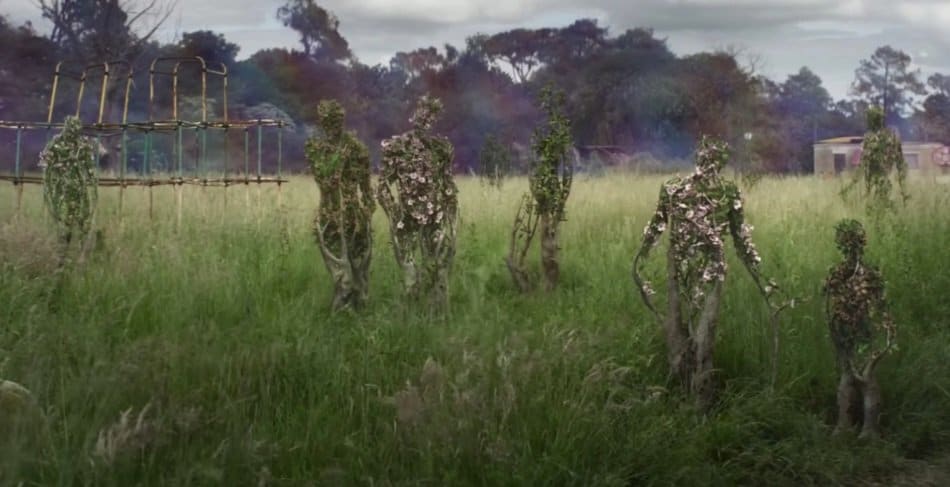Annihilation borrows from other broad-minded sci-fi films, several of which Garland’s worked on, while consistently feeling like its own entity. Garland, who wrote the screenplay for Danny Boyle’s Sunshine, incorporates that earlier film’s awe before nature and the universe into Annihilation. Darren Aronofsky’s The Fountain is evoked when the film gets into some third-act trippiness, as is Malick’s Tree of Life. Horror, specifically the body horror of the Lovecraftian Dead Space video games, is also present in one of cinematographer Rob Hardy’s more indelible shots. An otherworldly score by Geoff Barrow and Ben Salisbury is wholly unique, particularly a haunting four-note refrain, but Mica Levi’s work in Under the Skin looms alongside it. Coupled with the ‘group of individualized and competent soldier/scientists traveling into unknown territory’ plot base, Garland’s film is immediately recognizable to the sci-fi fan.
Thanks to the unique production design and writing, Annihilation’s structural familiarity lays the ground work on which some imaginative new edifices are built. Though it’s adapted from a series of books by Jeff VanderMeer, the author’s ideas are brought to vivid life. The shimmer allows for whatever the special effects crew can construct. Setting aside the artifice of natural selection that the film fails to effectively communicate as a reason why vastly different species are being smooshed together, that smooshing results in some beautiful and terrible creations. A crocodile with extra rows of teeth a la sharks is something that makes sense biologically, such that it’s a functional improvement from one static alpha predator to another. A bear creature makes less sense, but with some acoustic alterations, it becomes a horrific apotheosis of visual and aural terror, practically Giger-esque in its primal discomfiture. On the beauty side, Garland makes use of plant life to great effect. Flowering shrubs begin to incorporate human organizational genes and grow as bipedal topiaries, frozen in midstride on the forest floor. Again, whatever this means for biology i.e. what’s the evolutionary advantage of humanoid flowering plants gets elided for the imagery itself, and when it’s as striking as it is in Annihilation, scientific accuracy or coherency can be set aside.
The writerly aspect of Annihilation, in which each character can be fit into a thematic box, might be diminishing if that thematic box wasn’t so compelling. The aforementioned apoptosis that each of their psyches are going through largely revolve around grief and trauma. In the wake of some tragedy, the person that was prior ceases to exist, and a new person, informed by absence and the severing of a neurobiological link, must reassemble in the tragedy’s wake. The exploring quintet has experienced the loss of a child, a husband, suicide attempts, warfare, and isolation, all of which require some level of reinvention and adaptation to the post-experience world. Much like the shimmer is assembling new life from constituent parts, so too must the characters patch their psyches with whatever’s left over. It works as a tidy structure-function relationship, in keeping with the biological roots of the film.
Annihilation also serves as an example of effortlessly diverse casting. There’s no reason why the five explorers are cast as women within the film. It’s easy to imagine an all-male expedition, but Garland puts together a forum for five exciting female actors to strut their stuff in roles aren’t always available to them. Portman is reliable in the lead, as believable firing bullets from a crouched stance towards a croc-shark hybrid as she is curled up in bed alone, waiting for her husband to return to her. Jason Leigh’s stoic leadership is a welcome turn after her crazed roles in Good Time and Hateful Eight. Novotny is a nice surprise, Thompson’s introspective and underplayed turn culminates in the best line of the film, and Rodriguez’s gung-ho and broad-shouldered portrayal is in stark relief to her work on Jane the Virgin. There is the requisite sci-fi exposition that is always difficult to naturally convey, but each core cast member has more to do that rattle off jargon.
If the body of cinema was apoptotically throwing off cells, films like Annihilation would be the ones digesting their own DNA and being consumed for parts. With a budget in the mid-eight figures, it’s the kind of film that gets passed over in favor of films with three times the budget and a well-known property source, or a film with a budget 25 times smaller and in the hands of an indie studio. It’s great that films like this one can escape the signaling and persist in the bloodstream. Garland-as-writer has wowed me previously, but Garland-as-director is still not quite there. Danny Boyle or Mark Romanek can turn Garland’s high concepts into powerful displays of emotion, and Garland hasn’t mastered that talent yet. Provided films like Annihilation can continue to be made, he’s well on his way to making that leap. B

 RSS Feed
RSS Feed